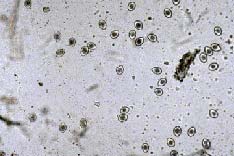 |
|
|
Coccidia
The first thing that has to be considered is that coccidiosis is very common. It is likely that 30 to 50% of puppies have Coccidia in their stools at some time during their first few months of life. These may be Coccidia from another species that the puppy or kitten has in the digestive tract due to ingestion of stool, such as rabbit feces, squirrel feces or cat feces. If this is the case it is unlikely that the puppy or kitten will actually have any clinical disease as a result of ingesting the Coccidia. In other cases, a puppy or kitten becomes infected with coccidiosis, produces lots of oocysts of Coccidia but never has clinical signs of disease such as diarrhea, loss of appetite, vomiting or failure to thrive. These pets may never show any clinical signs, and without signs it is questionable whether they should be treated or not -- although it is likely that almost all veterinary practitioners go ahead and treat for the infection. Isospora species can also be transmitted through ingestion of intermediate hosts, such as infected mice. Isospora species that affect dogs include Isospora canis, I. ohioensis, I. neorivolta and I. burrowsi. The species that affect cats include Isospora felis and Isospora rivolta. These Coccidia tend to be pretty species specific, so infection of a puppy or kitten is not thought to be a risk to humans and puppies are not a risk to cats or infected kittens a risk to dogs. It is very likely that if one puppy in a litter has Coccidiosis that all puppies are affected. It is extremely difficult to prevent Coccidia infections, especially in group situations, so puppies coming from a breeder with Coccidia is not an indication of poor sanitation or poor health care practices. It is simply a very common problem. Coccidia spread when oocysts are shed in the stool of infected pets and then the oocysts are consumed later by another susceptible dog or cat. Since incredible numbers of oocysts are shed from infected pets, the environmental contamination with Coccidia oocysts is severe. Puppies and kittens often show signs of illness -- usually watery diarrhea, before there are oocysts in their stools, so it sometimes takes several fecal samples to know if a puppy or kitten is infected. In addition, lots of dogs, cats, puppies and kittens are infected and are shedding oocysts despite having no clinical signs of infection. Coccidia are easy to find using standard fecal floatation methods for fecal exams and are often present in sufficient numbers to show up if a small amount of stool is smeared on a glass slide, mixed with a small amount of saline, and examined. General cleanliness does not ensure that infections will not occur, but removal of contaminated stool reduces the potential for infection. The oocysts are supposed to be pretty resistant to most disinfectants and things like steam cleaning or flame guns may be necessary to actually kill the oocysts -- which is impractical for most situations. Most of the time all littermates are infected. It is not likely that other species will be affected. The organism is spread in the stool, so keeping non-infected pets away from the stool of infected pets is helpful, but if they share a common environment it is highly likely that infection will occur. The infection may or may not cause clinical disease and treatment is generally considered to be necessary only for pets showing clinical signs. None of this information is guaranteed to be accurate -- always consult your veterinarian prior to making a decision on your pet's health. |
As an Amazon Associate we earn from qualifying purchases.
An absolute must have for any sporting dog owner. Save money on vet bills!
|
|||
Beagles & Rabbit Hunting Videos - DVD - FREE shipping!
Rabbit Hunting Online is a participant in the Amazon Services LLC Associates Program, an affiliate advertising program designed to provide a means for sites to earn advertising fees by advertising and linking to Amazon.com |
 Coccidia
are a group of protozoan parasites that are extremely common and which
infect a wide number of animal species, including dogs, cats, horses,
cattle, goats, sheep and chickens --- and many other species of animals
as well. The groups of coccidians that infect pets include Eimeria,
Isospora, Hammondia, Toxoplasma and Neospora. Of these, the two that
are usually referred to as "Coccidia" infections are Eimeria
and Isospora infections and the rest are generally identified by name,
as they are more complex parasites and cause specific disease problems.
Eimeria species are more commonly involved in infections in cattle,
sheep, horses, etc. and Isospora species are most commonly involved
in infection in dogs and cats. So for the purpose of the rest of this
article, the enteric (gastrointestinal) forms of Isospora are what
will be covered.
Coccidia
are a group of protozoan parasites that are extremely common and which
infect a wide number of animal species, including dogs, cats, horses,
cattle, goats, sheep and chickens --- and many other species of animals
as well. The groups of coccidians that infect pets include Eimeria,
Isospora, Hammondia, Toxoplasma and Neospora. Of these, the two that
are usually referred to as "Coccidia" infections are Eimeria
and Isospora infections and the rest are generally identified by name,
as they are more complex parasites and cause specific disease problems.
Eimeria species are more commonly involved in infections in cattle,
sheep, horses, etc. and Isospora species are most commonly involved
in infection in dogs and cats. So for the purpose of the rest of this
article, the enteric (gastrointestinal) forms of Isospora are what
will be covered.
